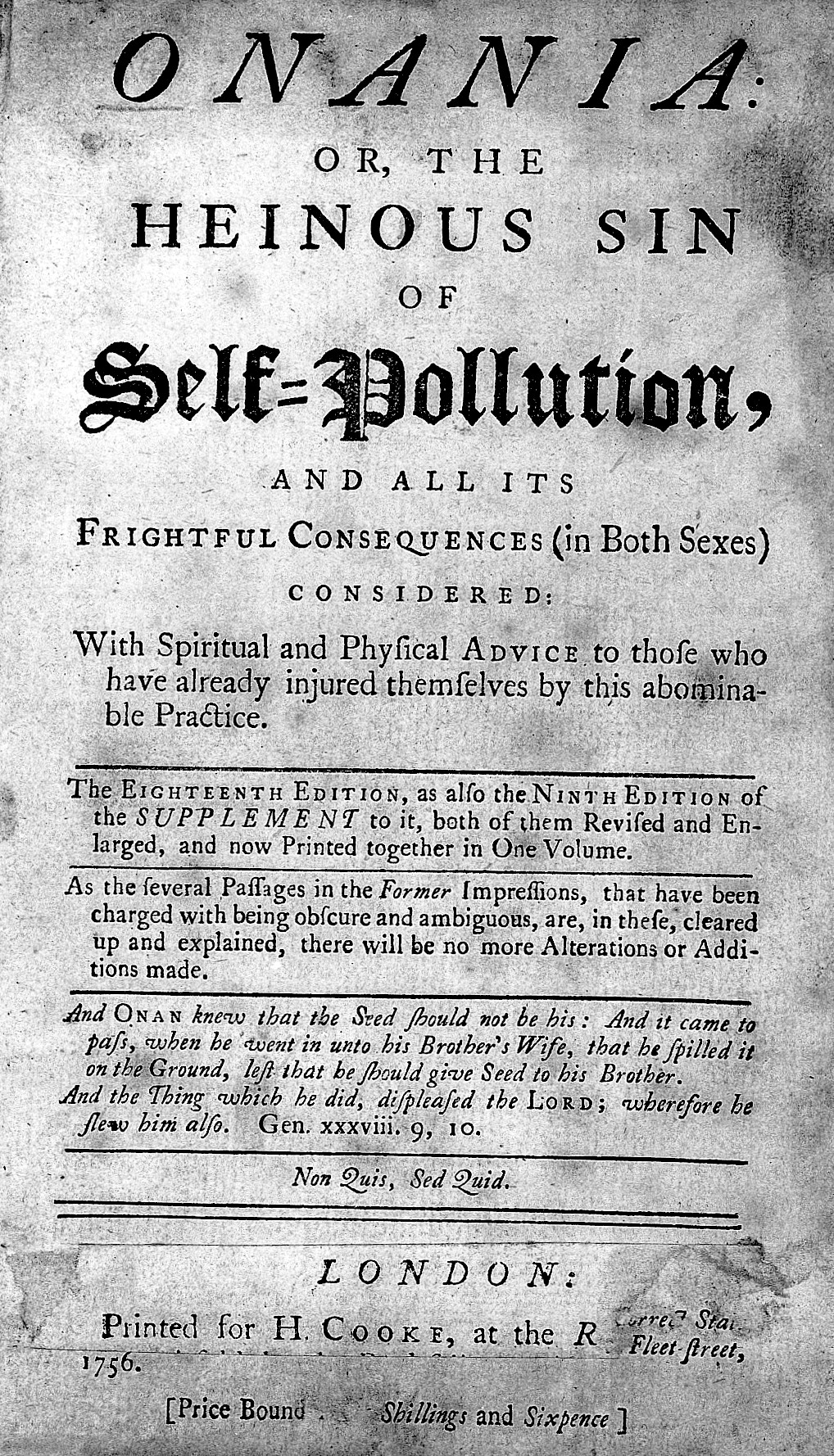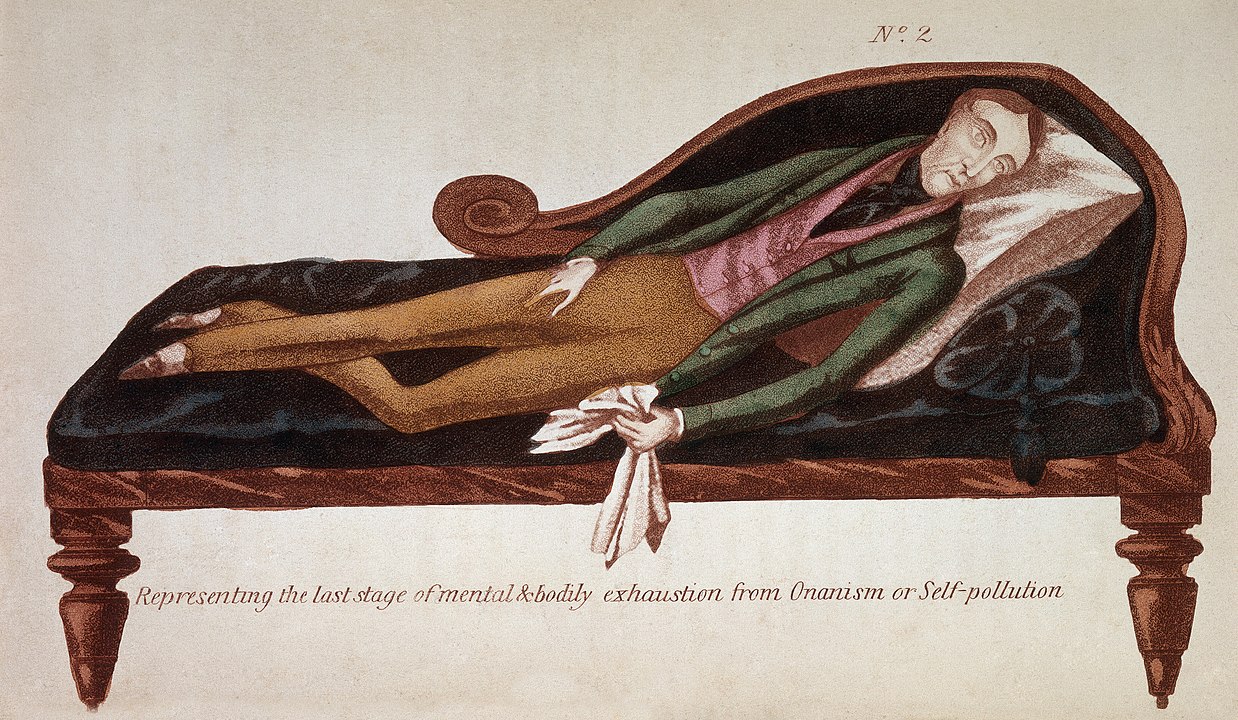
Imperial Russia saw the nation as the sea into which all the other Slavic cultures flowed. The idea persists today not only in Russia’s attitude towards its neighbourhood, but also in the way eastern Europe is studied in the West.
Masturbation became an important medical and moral issue around 1712, Thomas Laqueur argues. Increasingly viewed by Enlightenment thinkers as a pathology of the solitude of an unmoored mind, the private practice was quickly linked with feelings of shame and guilt, with implications for self and society that would last for centuries.
Modern masturbation can be dated with a precision rare in cultural history. It was born in, or very close to, the same year as that wild and woolly and profoundly self-conscious exemplar of ‘our’ kind of human, Jean-Jacques Rousseau was born. It arrived in the same decade as Daniel Defoe’s first novels and the first stock market crashes. (Readers will remember the repeated jokes – new at the time – in the first chapter of Gulliver’s Travels that Swift began in 1719: ‘Mr. Bates, my master;’ ‘my good master Bates’.)
It – by which I mean masturbation as a moral and medical problem that attracted the serious attention of the likes of Kant, Rousseau, Samuel Johnson, Voltaire and Samuel David Tissot, the most read medical authority of the century – is a creature of the Enlightenment. More specifically, it is intimately bound up with the question of solitude in eighteenth century thought.
To be precise, sometime between 1708 and 1716 the then-anonymous author of a short tract with a long title not only named (Onan had not before been associated with masturbation), but actually invented a new disease and a new highly specific, thoroughly modern, and nearly universal engine for generating guilt, shame, and anxiety. Its title: Onania; or, The Heinous Sin of Self Pollution, and all its Frightful Consequences, in both SEXES Considered, with Spiritual and Physical Advice to those who have already injured themselves by this abominable practice. And seasonable Admonition to the Youth of the nation of Both SEXES….

Onania: or, the Heinous sin of Self-Pollution, published in 1756. Image from Wellcome Library, London. Wellcome Images CC BY 4.0 via Wikimedia Commons.
‘In or around 1712’, onanism was loosed upon the world. The problem that had been so long ignored but that would come to play such a large role in the modern Western understanding of self and sexuality was this: ‘That unnatural Practice by which persons of either sex may defile their own bodies, without the Assistance of others. Whilst yielding to filthy imagination, they endeavor to imitate and procure for themselves that Sensation, which God has ordered to attend the Carnal Commerce of the two sexes for the Continuance of our Species’.
Modern masturbation is profane. It is not just something that putatively makes those who do it tired, crippled, mad, or blind, but is also an act with serious ethical implications. It is that part of human sexual life where potentially unlimited solitary pleasure meets social restraint; where habit and the promise of just-one-more-time struggle with the dictates of conscience and good sense; where fantasy silences, if only for a moment, the reality principle; and where the autonomous self escapes from the erotically barren here-and-now into a luxuriant world of its own creation. It hovers between abjection and fulfilment.
‘The solitary vice’ as the most common synonym for masturbation is an early nineteenth-century neologism, but the perceived moral and medical dangers of solitary sexual pleasure – solitary both in the sociological sense of being alone and unwatched and, more importantly, in the psychological sense of the self being alone with itself – were there at the start. Note in the description I just quoted ‘for themselves,’ ‘without the assistance of others,’ ‘yielding to filthy imagination’. Onanism as a paradigmatic pathology of solitude, of the mind unmoored.
In her review of my Solitary Sex: A Cultural History of Masturbation, (London Review of Books, 6 May 2004) Barbara Taylor argued that the book was essentially a history, writ on the body, of a new sort of self in society: ‘the sexuality of the modern self’ I called it. ‘Laqueur’, she notes, ‘presumes a caesura between the modern and the pre-modern. The modern masturbator stands on the near side of a cultural divide whose far side is a world where the moral hazards of sex were not those of rampant individualism but violations of a hierarchical, providential order.’ In other words, a new pathology of solitude, a new and powerful engine of shame was born and flourished as a bulwark against rampant individualism and the hazards of unmoored moral autonomy. The roots of Onanism in my account, Taylor argues, lie in ‘the predicaments of secularized subjectivity’
Taylor accepts these claims but argues, rightly, that it does not fully account for the novel shamefulness of Onanism, the new pathology of solitude. The shame, she continues, is rooted in the Christian notion of concupiscence, the idea most profoundly articulated by Augustine, that the estrangement of the soul from God is marked in the flesh by the autonomy of sexual desire, and, speaking as he does from a male perspective, signaled by the unruliness of the sexual organs. Adam’s shame at his nakedness came from an unwilled erection. (For Augustine the key is unwilled and unwillable. In a letter to Paulinus of Nola that he wrote in his old age, he said that his present impotence was just as much a sign of concupiscence as the erections of his youth.
If we think of the new shame of Onanism as grounded in the old shame of concupiscence then the stakes of a history of the solitary vice has to account not just for ‘a new relationship between self and society but [the] self’s relationship to the self,’ as Taylor observed. ‘We are none of us, female or male, masters in our own house,’ she writes – Augustine redux without original sin. She concludes with a Freudian twist: ‘“Shame” Jacqueline Rose wrote recently, “is one of the ways we try to forget part of ourselves,” and it is this amnesia that ultimately lay behind the masturbation panic.’

‘Representing the last stage of mental & bodily exhaustion from Onanism or Self-pollution’ An illustrtation from R.J. Brodie & Co.’s 1845 tractate ‘The secret companion, a medical work on onanism … and on venereal and syphilitic diseases … followed by observations on marriage.’ Image by Wellcome Library, London, CC BY 4.0 via Wikimedia Commons.
We do not have to choose between these perspectives. On the one hand, there is the novelty of a new pathology of solitude that cannot be explained by adducing an abiding engine of shame. Something changes in or around 1712 that demands an explanation. On the other hand, we need to account for the wild success of a Grub Street pamphlet that makes its way into the inner sanctums of the high Enlightenment and generates torrents of guilt at a practice that before had received almost no attention. It somehow mobilized a deep disquietude about the self’s relationship to its desires that did not suddenly appear with the early philosophes.
I propose briefly to make the case for my history of self and society. That is, I want to offer an explanation for what it was about solitary sex, as opposed to sex that was not practiced in solitude, that was purportedly so dangerous – medically and morally – in the particular circumstances of the eighteenth century and beyond. By offering the sketchiest of sketches of a social and cultural history of shame, I then want to return to Taylor’s argument about the persistent shamefulness of this one particular form of sexual activity – sex with one’s self – that had for so long gone unnoticed. Shame is an emotion that precisely bridges the space between society and self, outer and inner.
As Protagoras tells Socrates, after Prometheus had distinguished humans from other animals by giving them fire, Zeus gave them all equally both shame (Aidos) and justice, a sense of moral order, (Dike) so that they could live together in harmony. I will end with a modern redemptive twist on the solitary vice as a form of healthy self-discovery in solitude.
There is no question that that there is something specifically modern about the medical and moral anxiety surrounding sex in solitude. It emerged more or less from nowhere around 1712. The editors of the most exhaustive of the nineteenth-century medical encyclopedias gave over twenty-six pages and a long bibliography to its article ‘Onanisme’ because the author thought that no problem more deserves the attention of philosophers and doctors, as it represented a conjuncture of private health and public interest.
And yet, it fell to the moderns to recognize the importance of the topic. The ancients – Galen, Hippocrates, and the nearly two thousand year old tradition built on their work – almost unbelievably, he says – ‘viewed onanism with the most serene indifference,’ and insofar as anyone in the classical world discussed the matter it was only the satiric and erotic poets.
I might add that the rabbis had had all sorts of views of how exactly Onan had spilled his seed upon the ground – anal sex, intercrural sex, coitus interruptus, and, yes, perhaps also masturbation – but what became his eponymous sin in the eighteenth century (1712 to be precise) was of no concern. God struck him dead because he refused to have a child with his widowed sister-in-law Tamar, from whom would grow ‘the tree of Jesse’.
And while a long line of Church fathers and the theologians who followed them developed an exquisitely refined hermeneutics of sexuality – concupiscence was a central but by no means the only issue – they had almost nothing to say about solitary sex. St. Thomas Aquinas includes what we might interpret as the act under ‘mollities’ (from the Latin mollis for a condition of softness), but it is one in a long list of non-reproductive sexual acts that are not singled out as especially noteworthy. One unpublished fourteenth-century tract by Jean Gerson which Foucault in the History of Sexuality vol. 1 regards as one of the sources of later discourses of masturbation, does seem to address the subject, but it is a rare exception that proves the rule.
What then is the problem that beginning in 1712 captivated Europe’s – and later the whole world’s – doctors and moral philosophers and through them made men and women, boys and girls guilty and ashamed of a practice that in earlier ages would have passed notice? It was not sexual excess per se. S.A.D. Tissot, whose 1759 book on Onanism was translated into twenty languages over hundreds of editions and became the foundational text of modern masturbation, thought that it was ‘far more pernicious than excesses with women’ because these were mitigated by some measure of reciprocity and engagement. (Although much was made of the dangers of solitary sex, for women no one made the argument that it was more dangerous than excesses with men; in the case of children, it did not apply.
When Tissot and the great Enlightenment Encyclopédie pronounced on the subject, they located the evil genius of masturbation not in the lusts of the flesh, but in a generally benign faculty of the mind. Both distanced themselves from theological condemnations based on the violation of the telos of sex (reproduction) or the triumph of concupiscence.
Menuret de Chambaud, writing for the Encyclopédie, was perfectly clear that the problem was a secular one. Leaving theology aside, he writes that masturbation would not be so bad (and here comes the big ‘if’) if it were not in the thrall of an unmoored psyche. ‘Masturbation which is not so frequent, which is not excited by a fiery and voluptuous imagination, which is, in a word, spurred only by one’s need’, is not harmful at all.
In other words, if masturbation were natural – that is, the result of real sexual need – it would be fine. de Chambaud’s point in the Encyclopédie article is that it is not so easy to maintain moderate masturbation simply as an alternative way of satisfying ordinary, sociable sexual desire. Solitary sex was almost by its nature immoderate, because the imagination was not easily restrained. It had ‘the greatest part of the crime’, and thus the seat of the imagination (the mind and all that is connected to it was most severely punished for doing it.
A central problem with solitary sex as understood by the canonical text of the Enlightenment was that it was generally driven from within, driven by a ‘voluptuous, a fiery imagination’ that had only the most tenuous connections with all those charms, tricks, arrangements and physiological natural processes that drive a more social passion.
Rousseau, always ready with the psychologically astute reflection, always poised to transform a personal anxiety into a general truth, got it right when he considered masturbation in his Confessions. It was, he famously said, ‘the dangerous supplement.’ There was always something more, something unbounded, something that could not be satisfied and laid to rest. When he masturbated, the greatest and most original of the philosophes tells us, he would conjure up a sexually exciting image or story, become excited, and satisfy his desire, all without recourse to anyone. There was nothing to stop him from doing it again and again, ‘with’ whomever he wanted, whenever he wanted, and without any natural satiety. Masturbation was outside not just this or that form of restraint but all bounds whatsoever. There was no stopping it because it was so terribly easy, because it was so alluringly free, because it seemed to escape from any and all consequences, because it was so perfectly outside civilization.

This article was originally published in the Estonian journal Vikerkaar. Their 1-2/2021 issue focuses on solitude – review forthcoming.
The moral foreboding about masturbation that haunts the sexual awakening of Emile, Rousseau’s eponymous protagonist and, by extension, that of all adolescents has to do with the threat posed by the solitariness of a practice born out of the self, out of the imagination. And the secrecy of the act makes it all the more difficult to teach the practitioner that it is shameful.
‘If he [an educator’s pupil] were to know one time the dangerous supplement’ as a way of satisfying his sexual instincts, ‘he is lost’, declares Rousseau unequivocally. Not only would ‘he carry the doleful effects of this habit, the most disastrous to which a young man can subjugate himself, to the grave’, but by the very act he would be lost to his teacher.
But even more troubling is the fact that through masturbation Emile would become hopelessly enslaved to himself. Better to fall in love with an inappropriate woman. From such a fate, Rousseau is sure, he might be saved. But to be rescued from himself as the engine of sexual desire and satisfaction would be altogether another matter.
Ambivalent as Rousseau’s feelings were about the role of society in making us who we are, society still offered grounds for redemption. Pure interiority was harder, perhaps impossible, to reach. And pure interiority, driven by the possibility of endless, self-generated sexual pleasure was the most extreme case. ‘Deceitful’ and ‘counterfeit’ were the adjectives that came to Rousseau’s mind when he described the teacher’s worry in Emile about the collapse of his whole educational project should his pupil succumb to the secret vice.

Late 19th century male anti-masturbation devices, the likes of which were often used in mental institutions, and sometimes in the home. Photo by Wellcome Library, CC BY 4.0 via Wikimedia Commons.
Taylor is right. For the old-fashioned ‘concupiscence’ – desires of the flesh as a sign of the estrangement of the soul from God, of the lack of singleness of heart – we could substitute ‘the fiery imagination’, something unbounded that could not be laid to rest, even if the doctors and moralists of the eighteenth century wanted to distance themselves from so theologically loaded a term.
And she is right that ‘Protestantism, by drawing God – and the devil – into the individual psyche upped the ante. The inner world of the believer became a cosmic battleground, with sex as its front line.’ But it is not the only line of battle. A fiery imagination stimulated by the passions, as Taylor writes, ‘led believers to confuse inner states with outer objects, to mistake their own desires and fantasies for the living God,’ that is, to succumb to the dangers of Enthusiasm. I might add that other forms of secular concupiscence were also creatures of the Enlightenment; ‘alcoholism’ was another eighteenth century neologism.
The question remains why this one particular sign that we are ‘none of us, male or female, masters of our own house,’ – this act of solitary sex – became a new, lasting and paradigmatic engine of shame. If the gods gave humans shame to allow us to live together, the pedagogues, doctors, and philosophers of the Enlightenment worked so hard to make sex with ourselves shameful in an effort to allow us to live alone. It was a hard road to make something private and solitary shameful because shame is an emotion evoked in public through the real or imagined gaze of others. It was their project to make it shameful in the eyes of the self. And, in the long Augustinian tradition, they located it in the desiring flesh – an asecular appropriation of concupiscence.
I find it puzzling how difficult it has been to shake off what they wrought, this new engine of shame, this new purported pathology of solitude. In an age when the desiring flesh and the fervid imagination seem triumphant, masturbation remains, if not contemptible, then embarrassing and in need of defense. However, there is a countervailing redemptive feminist tradition beginning in the 1970s.
In her book Liberating Masturbation: A Mediation on Self Love, Betty Dodson straightforwardly makes the case that autoeroticism is both a politically and personally liberating act. A lively market in sex toys and a trove of articles in women’s magazines make the case. An avalanche of ‘woman-friendly’ porn – itself of course the subject of heated debate in feminist circles – is in its service.
But solitude still bears something of the sense that it is had behind closed doors and is therefore suspect. There is a passage early in Proust’s Swann’s Way in which the narrator, certainly no enemy of the imagination, writes of a room at Combray: ‘it was the only room whose door I was allowed to lock; whenever my occupation was such as required inviolable solitude, reading or day-dreaming, tears or sensual pleasure’.
This essay is mostly drawn from Solitary Sex: A Cultural History of Masturbation (Zone: 2003).
Published 27 January 2021
Original in English
First published by Vikerkaar 1-2/2021
Contributed by Vikerkaar © Thomas Laqueur / Vikerkaar / Eurozine
PDF/PRINTSubscribe to know what’s worth thinking about.

Imperial Russia saw the nation as the sea into which all the other Slavic cultures flowed. The idea persists today not only in Russia’s attitude towards its neighbourhood, but also in the way eastern Europe is studied in the West.

Karl Jaspers, Günther Anders and the nuclear dichotomy; how Israel’s allies have abandoned the Iranian opposition; and EU asylum policy ten years on from ‘Wir schaffen das’.